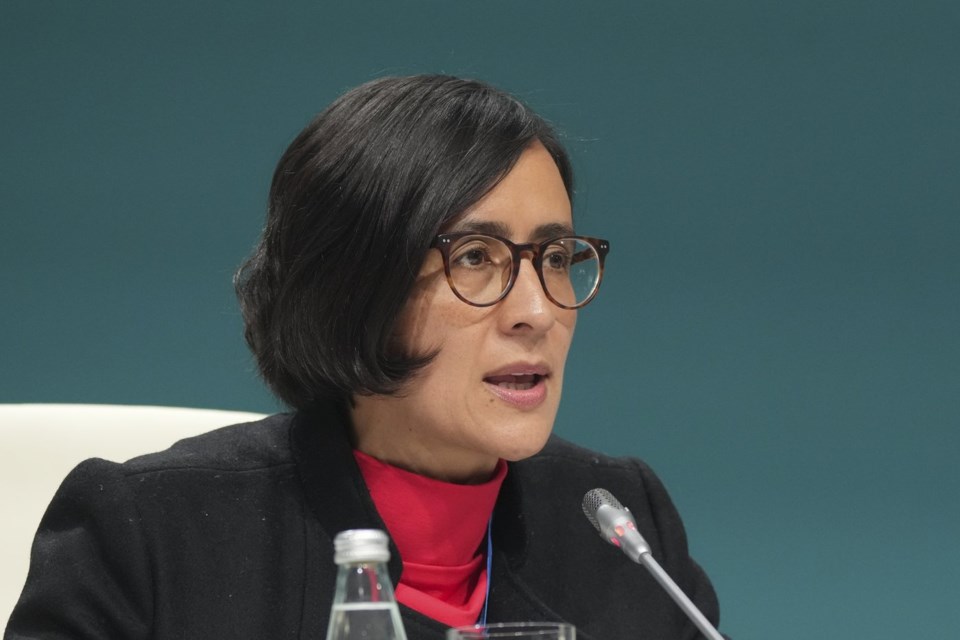BOGOTA, Colombia (AP) — Colombia's fiery left-wing President Gustavo Petro is one of the biggest opponents of fossil fuels on the world stage today, with speeches that lump oil and coal with cocaine as his country's “three poisons.” He's set a goal of , putting the green energy transition and environmental protection at the center of his agenda.
His opposition is long-held, but it's also practical. Colombia's oil reserves are projected to last only about seven years, and without new discoveries, the country will eventually have to find a way forward without the oil and coal that make up more than half its exports.
But doing so will require overcoming the same challenges that many smaller nations face with the energy transition: higher borrowing costs that more developed nations face, Environment Minister Susana Muhamad said.
Muhamad has been highlighting Colombia's challenge at in Azerbaijan, where the major goal of this year's talks known as COP29 is establishing just how much wealthy nations will contribute to the developing world to cope with climate change and transform their energy systems.
At a press conference on the sidelines of the climate talks Saturday, Muhamad said the world “cannot continue to play with the same financial rules that leave developing countries behind.”
Muhamad also touted her country's support for a non-proliferation treaty for fossil fuels. The treaty, modeled on others like a non-nuclear proliferation treaty, is aimed at ending the expansion of new coal, oil and gas projects, and manage a global transition away from fossil fuels.
“Oil is not a gift from god,” Muhamad told The Associated Press on the sidelines of COP29, referring to a comment made by Azerbaijan’s president Ilham Aliyev earlier in the talks. “It’s a trap. We need to untangle ourselves from that.”
“We’re trying to look for a path that actually helps us to be more resilient, be more competitive in a new era of economics where climate and people are at the center, so we can create a different economy,” she said. “But we are not finding a positive response towards this path.”
Developing economies face higher costs for renewable energy and sustainable projects due in part to perceived risks for investors, according to the World Economic Forum, which says significant international investment is necessary for the energy transition.
Muhamad said, like many developing nations, Colombia faces “unfair conditions” in accessing capital.
Petro, a former guerrilla with the M-19 Marxist group in his youth, is a longstanding critic of what he calls the “greedy” extractive sector. He has stopped approval of new oil drilling contracts, has banned fracking and pushed through some of the first offshore wind power projects in Latin America since taking office in 2022.
But his mission to leave fossil fuels behind has faced criticism.
Tomas Gonzalez, a former Colombia energy minister from the Conservative Party who now directs the Bogota-based Regional Center for Energy Studies, called Petro's approach "very radical".
“As long as there is demand someone will meet it, so restricting Colombian production doesn’t reduce emissions globally," Gonzalez said. “But for Colombia, it means major sacrifices in fiscal revenue and funding for public spending."
Oil and coal are key to Colombia’s national revenue, according to government data, accounting for about 8% of GDP and over 50% of its exports. It's the world's sixth-largest exporter of coal, according to the national mining agency, and a top-20 exporter of crude. But its oil reserves are considered small, at around seven years, according to the country’s oil regulator, ANH.
“We don't have huge reserves,” Muhamad said. "We are not like other countries which could have 200 years of oil under the soil. So as the world decarbonizes, our markets will be closing and we need a replacement.”
Colombia may have more oil and gas, but Petro’s administration has stopped issuing new oil and gas exploration contracts. Gonzalez called that “the opposite direction of what we need.”
Colombia launched a new investment portfolio at the end of September for its climate adaptation plans, which it hopes will attract around $40 billion to help fund ecotourism, a fair energy transition and conservation and restoration of ecosystems.
“Colombia is doing the right thing in a way by saying we need to move away from fossil fuels,” said Bill Hare, a climate scientist and chief executive of Climate Analytics, a science and policy group that supports action on climate change.
“They’re doing it for a combination of different reasons, some of them economic, some basically completely moral and oriented around the climate crisis. What is really bad that’s happening is that they’re not being backed up by the international financial community.”
Hare said the whole ecosystem of the international financial community is not backing Colombia up.
“They’re going with the fossil fuel industry. So Colombia is facing a downgrade economically because of that,” he said. “It will need backing. It may not be hard cash, but it could be debt guarantees. It can be all sorts of things like that that ultimately don’t cost a lot that make all the difference.”
For Gonzalez, when it comes to the energy transition, there are serious gaps between the ambitions Petro has set and the policies in place.
“Colombia needs to expand its clean energy supply and improve energy efficiency at a scale and speed far greater than what we’re currently achieving,” he said. “When you want to be a global leader the disconnect between goals and policy actions in this area remains a major challenge.”
___
Arasu reported from Baku, Azerbaijan. Associated Press writer Seth Borenstein contributed from Baku.
___
The Associated Press’ climate and environmental coverage receives financial support from multiple private foundations. AP is solely responsible for all content. Find AP’s for working with philanthropies, a list of supporters and funded coverage areas at .
Steven Grattan And Sibi Arasu, The Associated Press




